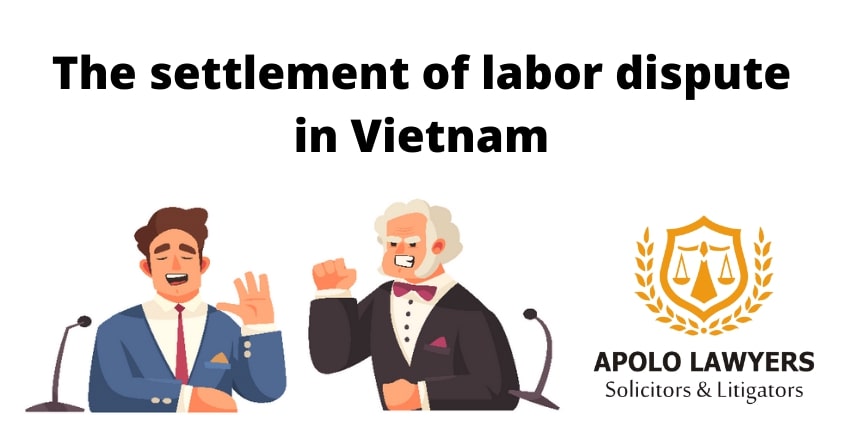With the opposing interests, the occurrence of disputes in labor relations is inevitable. Understanding the knowledge of labor dispute resolution is essential for both employees and employers. However, not everyone understands the provisions of the law on labor dispute settlement. Therefore, Apolo Lawyers (Tel (+8428) 66.701.709) provides customers with legal consulting services on the settlement of labor disputes in Vietnam, helping clients to have a general understanding of it as well as helping clients to avoid it.

When participating in labor relations, while employees want to reduce working – time and increase their salary, employers want to increase working – time, and productivity and reduce salary. Therefore, it is why conflicts between employees and employers always exist. Generally, the content of a labor dispute is usually the conflict about rights and obligations among the parties in the labor relations.
According to article 179 of Labor Code 2019, a labor dispute means a dispute over rights, obligations, and interests among the parties during the establishment, execution, or termination of labor relation; a dispute between the representative organizations of employees; a dispute arising from a relationship that is directly relevant to the labor relation.
Labor disputes arise and exist in association with labor relations. Concurrently, it is not just a dispute over rights and obligations among the parties, it includes disputes over the interests of each other in labor relations.
Depending on the scale and the number of one party of the dispute is employees, the labor dispute can be divided into these types:
This is a dispute arising among employees and employers; among employees and businesses or organizations which send employees to work overseas under the contract; between the dispatched employee and the client enterprise.
This dispute is a right-based or interest-based collective labor dispute between one or several representative organizations of employees and the employer or one or several representative organizations of employees. In this type of labor dispute, we continue to divide it into 2 little types:
Firstly, a right-based collective labor dispute of rights. It means a dispute between one or several representative organizations of employees and the employers or one or several representative organizations of employees in the following cases:
Secondly, an interest-based collective labor dispute includes (i) labor disputes that arise during the process of collective bargaining; (ii) a party refuses to participate in the collective bargaining, or the collective bargaining is not held within the time limit prescribed by law.

The settlement of labor dispute is a process in which the competent State agency will apply the provisions of the law to settle the individual dispute and the dispute between labor collectives and employers about the legitimate rights and interests of employees and employers.
3.1.1. The settlement of the individual dispute by labor mediators
Individual labor disputes shall be settled through mediation by labor mediators before being brought to the Labor Arbitration Council or the Court. However, in the following labor disputes, mediation is not mandatory:
In case of mediation is not mandatory as prescribed in Clause 1 of Article 188, Labor Code 2019, the labor mediator fails to initiate the mediation by the deadline specified in Clause 2, Article 188, Labor Code, or the mediation is unsuccessful as prescribed in Clause 4, Article 188 Labor Code the disputing parties may:
3.1.2. Settlement of individual labor disputes by Labor Arbitration Council
By consensus, the parties are entitled to request the Labor Arbitration Council to settle the dispute in any of the cases specified in Clause 7, Article 188, Labor Code 2019. The parties must not simultaneously request the Court to settle a dispute after requesting the Labor Arbitration Council to settle the same dispute, except for the cases specified in Clause 4 of Article 188. In cases that one of the parties does not enforce the award of the settlement of labor dispute by the Labor Arbitration Council, the parties can request the Court to settle the dispute.
3.1.3. Settlement of individual labor disputes by the Court
In case of mediation is not mandatory, the parties are entitled to request the Court to settle a dispute. If one of the party does not enforce the settlement of the labor dispute of the Labor Arbitration Council, the parties are entitled to request the Court to settle the dispute.
The following agencies, organizations and individuals have the competence to settle right-based collective labor disputes:
Right-based labor disputes shall be settled through mediation by labor mediators before being brought to the Labor Arbitration Council or the Court.
Agencies, organizations and individuals who have the competence to settle interest-based collective labor disputes include:
An interest-based collective labor dispute shall be settled through mediation by labor mediators before it is brought to the Labor Arbitration Council or a strike is organized.
>>> Read more: Labour contract in Vietnam
>>> Read more: The termination of labor contract in Vietnam
Using the legal consulting service on labor dispute resolution at Apolo Lawyers, you will be helped by us with the following tasks:
For further information, please contact us: Apolo Lawyers
APOLO LAWYERS
